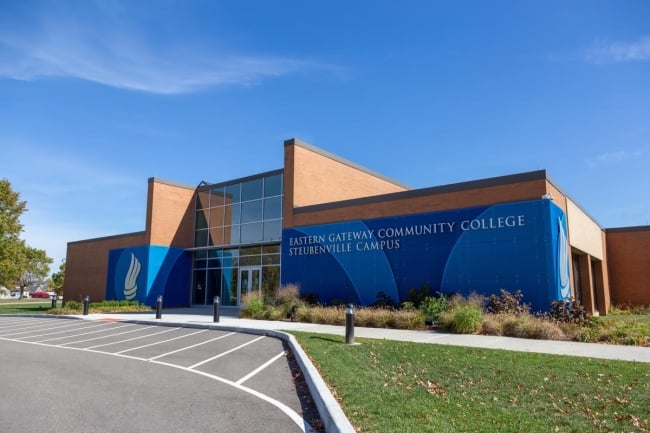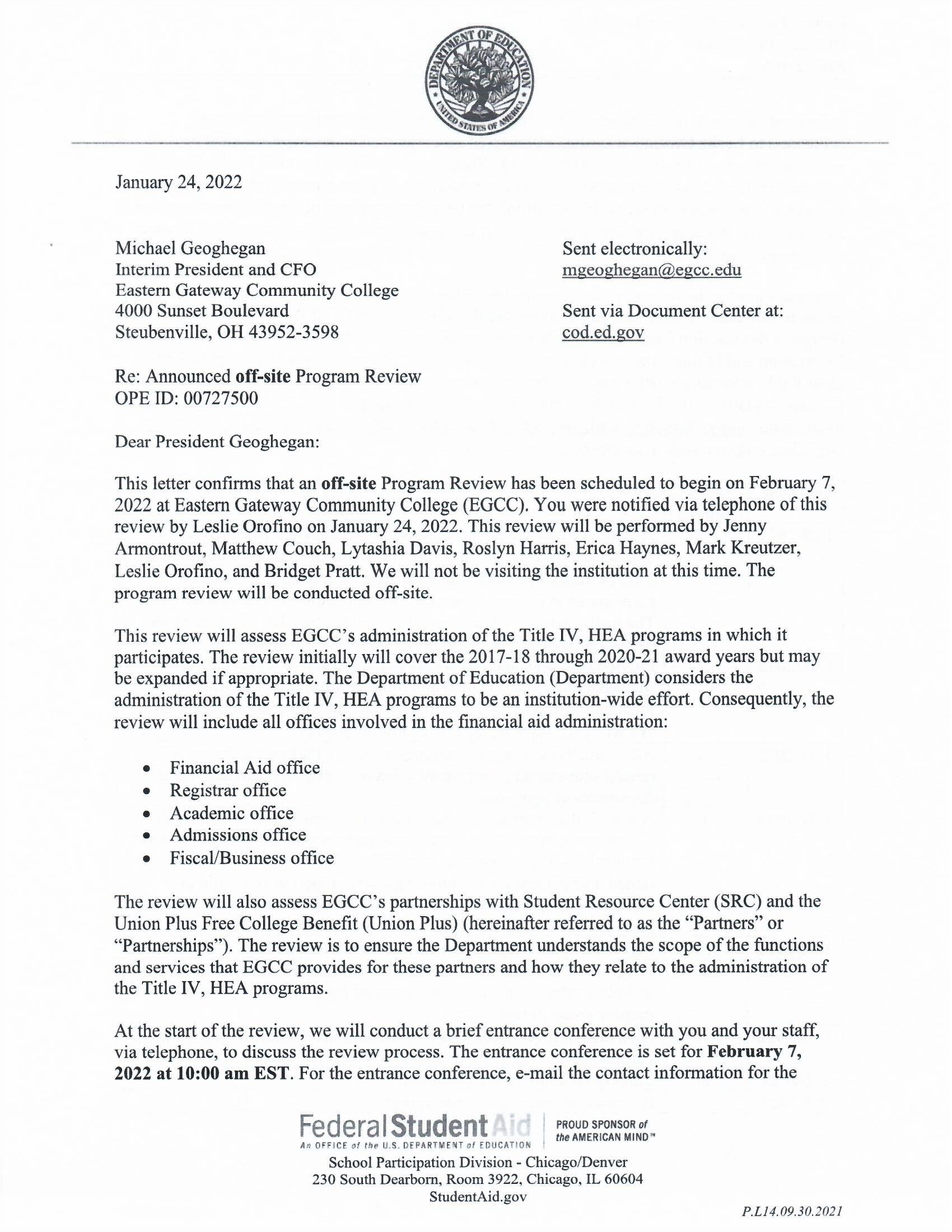You have /5 articles left.
Sign up for a free account or log in.

Eastern Gateway Community College
The U.S. Department of Education is investigating the use of federal financial aid at an Ohio community college that has come under fire for poor teaching quality and an unusual relationship with a for-profit company that recruits labor union members to attend the college for free.
The letter, which was sent to Eastern Gateway Community College Monday, zeroes in on Eastern Gateway’s partnership with the for-profit Student Resource Center and the Union Free College Benefit (Union Plus) program that EGCC implemented with SRC’s help. This partnership has led to explosive growth in EGCC’s online education programs in recent years—and to an accreditor’s recent decision to put EGCC on probation for failing to provide evidence that its “present business model offers a high-quality educational experience for students.”
SRC earns half of the profits Eastern Gateway takes in and walked away with slightly more than $7 million from the partnership in the 2020 fiscal year and about $10 million last fiscal year.
Eastern Gateway paid the Student Resource Center an additional $5 million last year “for direct services provided to the college through the form of advisors and financial aid help desk reps,” according to EGCC spokeswoman Amanda Wurst, who said via email last month that the payments were a result of SRC working with EGCC “to ramp up capacity to meet the needs of  a growing online population.”
a growing online population.”
Inside Higher Ed documented the accreditor’s scrutiny and the relationship between the college and the third-party provider in an extensive article in November.
The letter from the Education Department official notifying Eastern Gateway about the program review (at right) focuses on the college’s relationship with SRC.
“The review will also assess EGCC’s partnerships with Student Resource Center (SRC) and the Union Plus Free College Benefit (Union Plus),” the letter states. “The review is to ensure the Department understands the scope of the functions and services that EGCC provides for these partners and how they relate to the administration of the Title IV, [Higher Education Act] programs.”
The Department of Education letter makes clear that its examiners are interested in the financial relationship between the college and the outside company. SRC employees advise union members interested in attending the community college about their financial aid options, among other things, and the Department of Education explicitly requested information on “profit-sharing arrangements” offered to any personnel involved in admissions and decisions about awarding Title IV funding. The letter also asks EGCC to produce a list of all third-party servicers and other contractors involved in marketing, recruitment and/or admissions.
While the Student Resource Center says it does not directly recruit or market for the Union Plus Free College Benefit program and that it relies on the unions to get the word out, a phone number on the AFL-CIO’s Union Plus Free College website connects to an SRC phone bank, staffed by the company’s employees from the Eastern Gateway campus. An EGCC email address is also listed for those who want additional information, and the EGCC logo is prominently displayed on the free college page.
A Normal Inquiry?
Wurst confirmed the college has received the letter, saying via email that program reviews “are a routine function of the Dept. of Education [and] more than 100 were conducted for Fiscal Year 2020.”
However, Karen McCarthy, vice president of public policy and federal relations at the National Association of Student Financial Aid Administrators, said that while some program reviews are conducted at random, many others are launched in response to specific concerns about an institution’s practices. McCarthy called the letter’s focus on the SRC relationship unusual.
“It sounds to me like the department definitely saw the press coverage of the issues going on with the accreditor and then said, ‘Hey, this might be something we want to take a look at,’” McCarthy said. “It does not sound like a random review to me … If they are super specific about one particular topic, it is sometimes because there’s some reason that they have suspicions that something might not be on the up and up.”
McCarthy said that federal student aid guidelines prohibit entities that participate in recruiting students from providing “any commission, bonus, or other incentive payment based in any part, directly or indirectly, upon success in securing enrollments or the award of financial aid, to any person or entity who is engaged in any student recruitment or admission activity, or in making decisions regarding the award of Title IV, HEA program funds.”
Bob Shireman, director of higher education excellence at the Century Foundation, said the rule McCarthy cites does not always apply to online program management companies similar to SRC, because of an exemption for those that “bundle” the services they provide. He said the Government Accountability Office is close to publishing a report studying the OPM industry, and that report may help crystallize rules in the future, but for now OPMs have some cover to help with recruitment while also sharing in revenue.
“It falls into a gray area … that the Education Department examiners would find worthy of deeper investigation,” Shireman said. “And so it will be this sort of thing that they look into: Who is involved in recruiting? How are they being paid?”
Eastern Gateway faculty members have long worried that SRC exerts too much influence at the college and that the college might be misusing federal financial aid dollars.
At a February 2020 union meeting with the outside company’s chief strategy officer, John Haseley, faculty members told Haseley they believed the union free college benefit model depended on enrolling a student body that is 40 percent Pell eligible so that “those students subsidize others.”
“We stated concerns about the ethical use of student Pell Grants and the large technology fees with which Pell eligible students are saddled,” the minutes said. “We mentioned the concerns we have with students who seem to be taking advantage of the ‘free college’ program as they are not degree-seeking.”




